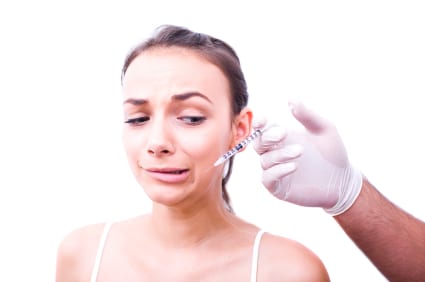Many women request Botox cosmetic treatments to reduce the appearance of facial wrinkles or to stop excessive underarm sweating, according to MedlinePlus and the Mayo Clinic. In some instances, Botox injections can also be used to treat painful symptoms associated with medical conditions. However, while Botox can smooth out your wrinkles, it poses certain dangers. Botox is made from the same bacterium that can cause botulism; the Botox treatment can potentially cause some unpleasant side effects. If you’re considering getting a Botox injection, here’s everything you need to know about the treatment’s side effects. Pregnant and breast feeding moms should never get Botox injections because of these risks.
Flu-Like Symptoms
Clostridium botulinum, the bacterium that comprises Botox, can cause flu-like symptoms among some patients, according to MedlinePlus and the Mayo Clinic. Headaches and nausea are also possible adverse side effects of Botox. Some reactions can become just as life-threatening as botulism food poisoning and are characterized by signs and symptoms similar to that ailment. Patients who may have contracted a serious illness from Botox cosmetic injections usually exhibit trouble talking, trouble swallowing, breathing problems and significant muscle weakness. These symptoms require immediate medical help.
Pain
One of the risks associated with Botox is pain around the injection area, according to MedlinePlus and the Mayo Clinic. Sometimes, bruising or redness also accompanies pain at the injection site.
Eyelid Drooping
Botox injections can cause eyelid drooping on occasion, according to MedlinePlus and the Mayo Clinic. However, keep in mind that this is relatively rare; MedlinePlus notes that Botox injections are sometimes used to reverse neurological conditions, such as uncontrollable eyelid blinking or blepharospasm and the muscle-twitching disorder, cervical dystonia.
Reducing the Risk of Side Effects
You cannot totally avoid unexpected reactions to Botox injections, but you can reduce your risks of unwanted and even life-threatening side effects, according to the Mayo Clinic. Be sure to select only board-certified doctors to administer your Botox injections, whether your aim is to fine-tune wrinkles or stop excessive underarm sweating. Blood-thinning medications, such as aspirin, warfarin or heparin, may increase your risks of Botox complications. However, since some cardiac patients cannot safely stop using such medications–even temporarily–you should openly discuss your medications and overall health history with the doctor.





